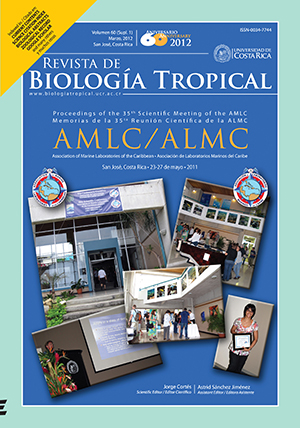Abstract
Annual benthic and fish population surveys were completed at five locations in the nearshore waters along Grenada´s southwest coast during 2008 - 2010. Two survey sites are located in a newly launched Marine Protected Area (MPA). Photo Quadrat (PQ) and Point Line Intercept (PLI) surveys were used to determine substrate cover. Algae was the primary live cover increasing significantly from 45.9% in 2008 to 52.7% in 2010 (PLI). Algae was also predominant (61.0% - 59.3%) in the PQ surveys although annual variation was not significant. Hard coral cover ranged from 16.5% to 15.4% (PLI) and 11.4% to12.0% (PQ) with no significant differences between years. Branching and encrusting corals occurred more frequently than massive corals. In the three annual surveys neither algal cover nor hard coral varied significantly between MPA and non-protected areas (PLI). Relative abundance of fishes along 30x2m belt transects did not vary significantly among years however density of fishes decreased significantly across years for most major groups. Chromis spp. dominated the survey sites at 65.2% in 2008 and 49.8% in 2010, followed by territorial damselfish,11.1% and 15.5%, wrasse increased from 7.3% to 15.5%. Both the substrate cover and fish survey data analyses indicated a stable but degraded community. Annual surveys are planned at these sites for the foreseeable future. Existing and future data from this project will be valuable in determining the efficacy of MPA management, guiding resource management decisions and monitoring the health status of Grenada’s valuable reef systemsComments
Downloads
Download data is not yet available.






